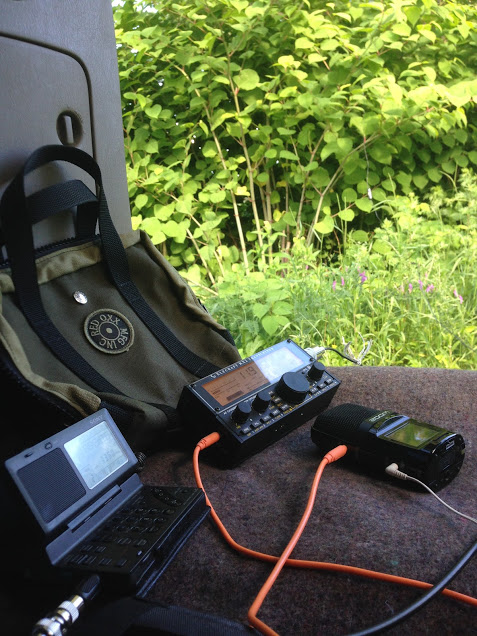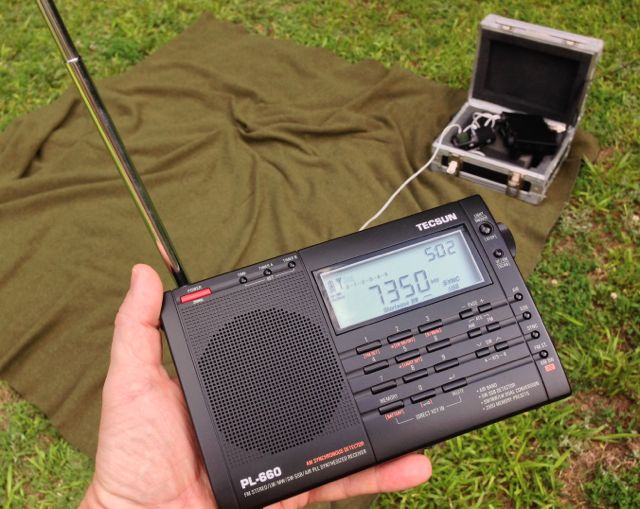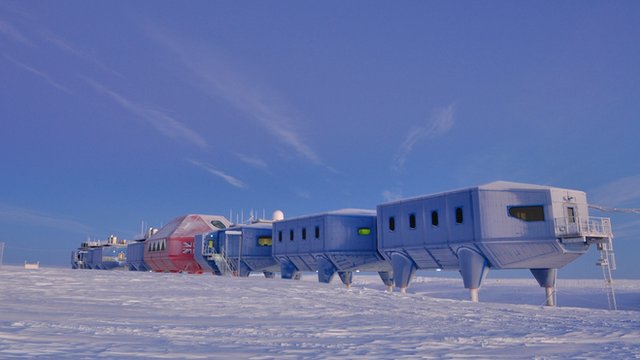In the comments section of this post, I’d like you to share your recording of the BBC Midwinter Broadcast to Antarctica!
Time and frequencies
Our intrepid contributor, Richard Langley, reports the following message from the British Antarctic Survey:
The BBC Antarctic Midwinter Broadcast will be transmitted at 21.30 GMT on 21 June on shortwave frequencies: 9585kHz, 11685kHz and 9870kHz.
Please comment with your recording on this post!

Listening to the 2017 BBC Antarctic Midwinter Broadcast from the back of my vehicle in Saint-Anne-de-Beaupré, Québec, Canada.
I’ve created this dedicated post where you can comment and include links to audio and video of your 2024 Midwinter Broadcast recordings. This will allow you to post your logs and recordings at your convenience without my availability becoming the bottleneck.
Here’s the format I’d like you to leave in your comment of this post:
Name:
Listening location:
Notes: (Include frequencies and any details about your receiver and antenna.)
Link to audio or video: (YouTube, Vimeo, Internet Archive, SoundCloud, etc.)
Video and Audio Recordings
 There is no way to directly upload audio in your comments, however, you can link to the recordings if you upload them to the Internet Archive (which I’d highly recommend) or any of the video streaming services like YouTube and Vimeo–or audio services like SoundCloud.
There is no way to directly upload audio in your comments, however, you can link to the recordings if you upload them to the Internet Archive (which I’d highly recommend) or any of the video streaming services like YouTube and Vimeo–or audio services like SoundCloud.
To be clear: I will not have the ability to upload your videos for you–so please don’t email me your video files–you’ll simply need to upload them to a service above and share them here with a link in the comments. 🙂
As with each year, I’ll make sure the BAS team and the BBC receive a link with all of your recordings!


I’m a little late posting here but I started with the transmission on 11685 Khz from 21:30 – 21:40:
S 4, I 3, N 3, F 3, O 3.
Had some RTTY interfering.
Then 9870 Khz from 21:41 -21:50:
S 2, I 5, N 2, F 3, O 2.
Was using a Tecsun 990x with a reel out antenna, 22 feet.
Location is Conway, SC. 73!
https://x.com/times3557/status/1804323228778664157
https://x.com/times3557/status/1804324470909174269
11685 just above the noise floor but could discern male and female voices.
Central New Mexico
IC-7300 with an OCF dipole.
Hi
I had very good reception at my home in south central Connecticut on 11685 and good reception on 9870. I am in a rural area about 15 miles north of Long Island Sound.
With my Tecsun H501x I was hooked to forty feet of copper wire:
https://imgur.com/a/u5XsvMx
1979 Trans-oceanic 7000 (slide rule frequency a little off0 using just its whip:
https://imgur.com/a/Alsi7hs
Just couldn’t pull in a good enough signal to record on 1950 Trans Oceanic G500 or 1936 Zenith Console.
Location = near Venice Italy
Frequency = 9870 khz
Radio receiver = Tecsun Pl 368 with a telescopic antenna
Note : Good reception
https://youtu.be/hiWtm90VC8A
Giuseppe Morlè iz0gzw
Formia, centro Italia sul mar Tirreno.
Tecsun H501 / filo 10 metri sul balcone di casa.
Ottima ricezione su tutte le frequenze.
https://youtu.be/8DIS_P9qrCI?si=yuAB2CkLB8Oo0HUj
Saluti e buon ascolto.
73.Giuseppe Morlè iz0gzw.
Julio Cesar Pereira
Terra de Areia-RS, southern Brasil
Frequencies: 9870kHz/9585kHz (weakest)/11685kHz (strongest)
RX: Malahit V3 + active loop antenna indoors
https://youtu.be/0ueJ3mTFsiI
11685 kHz using AM-Sync (LSB).
Began as about S5 signal strength, ended about S7.
Location Campton Hills Forest Preserve, St. Charles IL.
Loop-On-Ground antenna amplified by Welbrook Medium Aperture preamp, into AirSpy HF+ SDR & laptop using SDR Console 3.2.
Strong RTTY station on 11690 kHz prompted recording on the lower sideband. Thunderstorm noise persistent.
https://archive.org/details/bbc-midwinter-2024-21-jun-2024-21h-30m-00s-z-11.685-mhz-ecss-l
Click here to view image of setup.
Name: Hugo López (CE3BBC)
Location: Santiago, Chile
Frecuency: 11.685 Khz
Youtube: https://www.youtube.com/watch?v=ILH7Oin0nwM
Hugo López Call Signal Ham CE3BBC
X @ce3bbc
Reception in Santiago, CHILE, Sout America.
Only 11.685 Khz.
Good signal, antenna “Dipolo V”
https://youtu.be/ILH7Oin0nwM
Name:
John Zachary Alvarez
DU1006SWL
Listening location:
Dasmariñas, Cavite, Philippines
Notes:
Receiver: Sihuadon D-808
Antenna: Tecsun AN-03L (External) & Telescopic antenna
Frequency:
• 9585 kHz – Weak (Telescopic)
• 9870 kHz – Fair to Good (External) but Moderate adjacent interference.
• 11685 kHz – Good (External) but Moderate adjacent interference.
Link to audio or video:
An excellent catch for your location! and with the radio’s whip antenna. Good for you!
Yes, excellent catch from the whip antenna. You have a very well-worn portable radio 🙂
No recording, just reporting:
Carl
KG4DLI
Location: Greenville, S.C. — local park away from noise.
Rig: Sangean 803A
Antenna: Stock whip
11865 was the only frequency usable. Maybe S3 at best. Had to use SSB and rig’s equalizer to pull it out.
9870kHz: Signal barely evident, but not listenable.
9585kHz: No signal evident during window.
Exact same experience here!
Bogotá D.C.- COLOMBIA
The best signal listen here was 11.685 kHz, I listened to the first minutes of the broadcast outdoors in a nearby park, with the receiver XHData D-808 and Sony AN-61 Antenna. Then with SDR Elad FDM S2 and Dipole 15 m antenna.
https://www.youtube.com/shorts/JrllZU-b_4E
Excellent copy on all 3 frequencies from sign on. My audio at this link:
https://www.dropbox.com/scl/fi/m1770huwgjge0eei0rzq9/BBC-spl-brcast-2024.mp3?rlkey=yv5gwhzd7x2xzyba1o6qpe7hz&st=g5f3or9c&dl=0
Using a WinRadio G33DDC. The antenna is a 120′ sloper backfed and using my ham radio tower as a reflector.
https://www.dropbox.com/scl/fi/m1770huwgjge0eei0rzq9/BBC-spl-brcast-2024.mp3?rlkey=yv5gwhzd7x2xzyba1o6qpe7hz&st=9z9a24w9&dl=0
Received on 9585kHz (FT-891 with Wonder Wand whip) and 11685kHz (IC-7200 with Wellbrook loop).
Location was North Hampshire, England.
Signal started off well on both frequencies, but deteriorated 15 minutes in and was largely undecipherable after that.
11685 disappeared for a short time at around 21:50 UTC but then resumed.
YouTube clip at: https://www.youtube.com/watch?v=0LOYhKuhVrY
Listened in Nottingham, England.
9585 kHz – very good
9870 kHz – Fair
11685 kHz – good
Receiver: NASA Target HF3
Antenna: G5RV Dipole
Time: 21:30 UTC
Short video clip added on.
73
Location = near Venice Italy
Frequency = 11685 khz and 9585 khz
Radio receiver = Tecsun Pl 368 with a telescopic antenna
Note = reception was very good. At the end of broadcast ( 21:52 Utc) some issue on 11685khz
https://youtu.be/NK9k4RTkGgg
11.685 Khz. Reception in Santiago, CHILE, South America.
73s
HUGO
[email protected]
Listening from Sodus, NY, near the shores of Lake Ontario, on a barefoot CCrane Skywave SSB, AM mode (tried SSB, it didn’t help). No recording.
9585, 9870 — heard nothing.
11,685 — very difficult copy, surging static. Could hear male and female voices but couldn’t discern what they were saying, occasional music (?)
Around 2140 — child’s voice saying “we miss you.”
Music at end.
Cheers, Jock
Nick Booras
Dallas, Tx
Icom 9500, Wellbrook Loop fixed in east-west position, couldn’t get anything on either 9 mhz station. 11.685 faded in and out. Sync was very helpful
https://youtu.be/W3TjN600Pto?si=yJsXJ5HZAXcnwe2Q
A post facto post?
11685 S5-S7 signal. At 21:51, signal interrupted for about 30 seconds, then resumed. Will share recording later.
Name:
Peter Jernakoff
Listening location:
Wilmington, Delaware USA
Notes:
Receiver = SDRplay RSPdx running with SDR Uno
Antenna = HyGain AV-640
Frequency = 11685 kHz
Date = 21-Jun-2024
Time = 2130 UTC (start)
SINPO = 55555
Comments ? Excellent signal, very interesting program!!
Link to audio or video:
A link to an audio clip of the program’s first 12 minutes is provided below. (The first ~23 seconds of the clip features a loud tone.)
https://www.dropbox.com/scl/fi/kmny37j9brzizza3zfmq2/11685-kHz_2130-UTC_21-Jun-2024_BBC-Midwinter-Broadcast-to-Antarctica.mp3?rlkey=v80iqj0mq0blcfe6zntgptqbn&st=66vu0as8&dl=0
Name: David Iurescia (LW4DAF)
Location: Berazategui, Buenos Aires, Argentina
Frecuency: 11.685 Khz (Best of the three from here)
Youtube: https://www.youtube.com/watch?v=GsoBm3C38AU
William, KR8L, WPE9FON
Listening from: EM57pe
11685 SINPO 25341, audible but essentially unusable. I can tell there is a signal on 9585 but that’s all. Receiving with my Yaesu FTdx10 and Butternut HF9V, recording on my shack PC via USB connection to the transceiver.
30 second recording uploaded to my Google Drive:
https://drive.google.com/file/d/1gTs-ncGaiVkBr0Yi_YGqR1tcE8an_wpk/view?usp=sharing
73 All!
BBC to Antarctica reception samples, on 11685Khz and 9585KHz.
Location: Lisbon Portugal
Date, time a and frequencies on the file names.
No reception at all on 9870KHz 🙁
https://drive.google.com/drive/folders/1aJcEXCuAOxg_hxpNB7YONxKwk1I7gUgP?usp=sharing
Wilson py2335swl
Brasil, GG66
listened on the 3 frequencies with clearly 11685khz been the best
What is the Wooferton frequency???
9585 khz and 11685 khz
I’ve always found it amusing/ironic that the BBC program with the smallest intended audience probably has a larger than normal unintended audience. I’ll be listening.
It’s worth noting for anyone who is unable to receive the broadcast for whatever reason, it can be streamed here:
https://www.bbc.co.uk/programmes/w3ct6r89